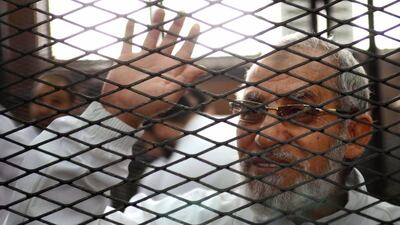There is little doubt that the landscape of Islamist groups in the Middle East has changed dramatically since the eruption of the Arab revolts. Salafis have become more politically active. Al Qaeda elements have adopted new strategies to establish roots within local communities where they operate. Shia groups have changed in ways that have yet to be properly understood and absorbed, from being more politically and militarily active to crossing borders for the first time to fight jihad.
But perhaps the most significant of all such developments is that of the Muslim Brotherhood. The organisation's evolution is particularly consequential because its post-Arab Spring rise has laid bare many established assumptions about the organisation, especially in western scholarship. These beliefs have sometimes guided western policies towards political actors, so rethinking them is key to better understanding the region's politics and religious dynamics.
One of these long-held assumptions is that the Brotherhood is moderate. The idea became popular after the September 11 attacks when experts with some knowledge of the region began to counter the myth that all Islamists are Al Qaeda. Also, those who worked in the security field began to look for alternatives to Al Qaeda, and saw in the Brotherhood a potential ally. But the little-developed notion was taken a lot further – by experts outside the region and by the Brotherhood and its sympathisers – to incorrectly label the organisation as “moderate”.
“They looked at the Brotherhood as ‘moderate’ because it participated in elections, said it supported rights for women and minorities, and renounced violence, albeit with some major caveats, ” said Eric Trager, Esther K Wagner fellow at the Washington Institute, a US think tank.
Mr Trager said that one of the problems with this notion is that experts did not look beyond the Brotherhood’s rhetoric – that the organisation represents the “islamiya al wasatiya”, or moderate Islam – and ignored how the group functioned in the real world. He said that the slogan of “we are not Al Qaeda”, which does not automatically make a group moderate, was exactly how the Brotherhood explained what their philosophy was.
“Many of the scholars who insisted that the Brotherhood would act ‘moderately’ or ‘democratically’ knew nothing about [the] internal features of the organisation. They were too obsessed with combating the silly all-Islamists-are-the-same argument,” Mr Trager said.
In fact, the danger of the Brotherhood is not that it is not a moderate organisation, but that its philosophy is slowly but surely dismantling the institutional moderation that has existed in Islam’s mainstream scholastic traditions for centuries. Its ideology makes power, or hakimiya, a fundamental part of religion rather than a means to safeguard the welfare of Muslims, as mainstream Muslim scholars have maintained.
The Brotherhood considers the political process as an end in itself, which leaves the window open for reinterpreting Islam to reach that goal. This tendency to subject Islamic principles to an overarching aim is often confused with being pragmatic. Mainstream Islamic scholars oppose many of the practices endorsed by clerics affiliated to the Brotherhood and jihadis, such as suicide bombing, by virtue of strict commitment to Islam’s principles. It is not surprising, therefore, that many of the violent groups in the modern Muslim world have historically emerged from, or have been influenced by, the Brotherhood.
While mainstream Islamic scholarship adheres to established orthodox norms, the ideologies of both the Brotherhood and Salafi jihadism are fluid, malleable and can be used to justify any means to reach goals. The irony is that orthodox Islam is often associated with extremism, sometimes for good reasons – because it is too slow to embrace modern practices. But it is important to distinguish between rigid religious practices and radical political ideologies that endorse violence and erode institutional moderation.
In terms of radicalisation, the Brotherhood is closer to Salafi jihadism and the ideology of wilayat al faqih (the rule of the cleric, which governs Iran and many Shia groups across the region), relative to traditional Salafism or mainstream Shiism, than academics are ready to admit. Another danger of the Brotherhood, even in comparison to openly jihadi ideologies, is that the perception of moderation and pragmatism helps it to normalise radical views within Muslim societies.
Of course, the Brotherhood has historically shown flexibility on certain religious matters, such as beards and niqabs. But it is important to recognise that the roots of such flexibility actually come from Salafi traditions, rather than being a trait the organisation can claim for itself. As Raphael Lefevre writes in his book Ashes of Hama: The Muslim Brotherhood in Syria, early Brotherhood thinking was shaped by reformist and moderate Salafi scholars. Reformist religious reasoning, or ijtihad, is at the heart of traditional Salafism, but the Brotherhood has used it to manipulate religious texts rather than using it to develop an interpretation of Islamic Sharia that upholds the moderation that the group is preaching in public.
The pace of events in the region makes it hard to absorb the changes in the Islamist groups’ landscape. But urgency must be assigned to the trend of misrepresenting dangerous thinking and presenting it as moderate.
hhassan@thenational.ae
On Twitter: @hhassan140

